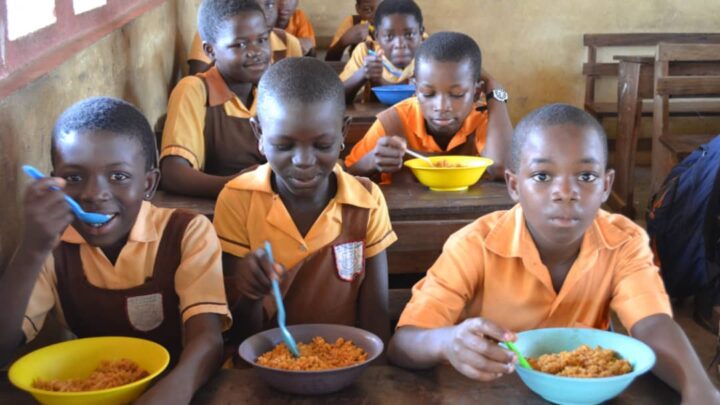Not until the break of COVID-19 pandemic in 2020 and its telling outcomes did the government’s school feeding become ingrained in the consciousness of Nigerians. The vulnerability of the children had become so exposed that the adequate care for their well-being could no longer be taken for granted.
Although the Federal Government had launched the School Feeding Programme (SFP) in 2005 with the assistance of the United Nations Children Education Fund (UNICEF) and the New Partnership for Africa’s Development (NEPAD), not much had been achieved until it was relaunched in 2016 under the name National Home Grown School Feeding Programme (NHGSFP) with the aim to establish a safety net for the poor, increasing enrolment, and eradicating malnutrition in school-age children while also stimulating the national agricultural economy. Not a few saw the government effort as remarkable, especially on the aspects of stimulating the national agriculture economy and adhering to the ‘Zero hunger’ tenet of the Sustainable Development Goals (SDGs). Essentially, the SFP itself had been initiated in 2005 as a social protection intervention in the context of the Comprehensive African Agricultural Development Programme (CAADP) Pillar III and in response to the first and second Millennium Development Goals (MDGs). The SFP is also targeted at having a significant positive effect on growth and cognitive performance in children.
According to a 2021 report by the United Nations World Food Programme (WFP), the SFP has significantly increased school enrolment across Nigeria. The report said the programme had served school meals to over nine million students in 53,000 public primary schools in Nigeria, making it one of the largest school feeding programmes in entire Africa. Aside from promoting nutrition education and better eating habits and encouraging the diversification of production with a special emphasis on local crops, the programme has boosted the local economies by buying the products of smallholder farmers and providing jobs to more than 107,000 cooks from low-income families. The schools also provide local farmers with a predictable outlet for their products, leading to a stable income, more investments, and higher productivity, even as the children enjoy healthy life that makes them more likely to stay in school.
Amidst public criticism of the NSP as one of the channels by government officials to siphon public funds, the National Coordinator, National Social Investments Programme (NSIP), Dr. Umar Bindir, has said that the programme has since gone beyond feeding the children to engaging women to become entrepreneurs and good food providers, in addition to enhancing the commercial and entrepreneurial value of small scale farmers.
Advertisement
Figures released by the Federal Ministry of Humanitarian Affairs, Disaster Management and Social Development which superintends over the school feeding programme show that 55, 449 are involved in the programme while 9,990,862 pupils have so far benefited in all the states across Nigeria and the Federal Capital Territory, except Bayelsa that has yet to come on board but would soon be on board. Over 128,531 cooks are also employed to provide one meal per day to the pupils. In Kano State alone, there are over 1.2 million school children being fed daily by 12, 528 cooks with ten aggregators supplying the food items. The cooks, who are selected by their various state governments, also have their salaries paid directly into their accounts in a transparent manner. About 4.1 million pupils have also been captured in the NHGSFP database.
A six-year-old pupil of LEA Primary School, Jabi, Abuja, Ja’afaru Ibrahim, confessed that the meal has attracted him and his mates to attend classes daily, despite the challenges that their families encounter. “Sometimes, we don’t eat at home but we are assured of eating rice or beans or indomie in school. This makes school interesting to me,” said little Ja’afaru. Another pupil in the school, eight-year-old Christina Emmanuel, said some of her mates that had not attended school regularly have since turned a new leaf, as it were. “We always have full classes regularly these days and I get excited to see my friends every day in school,” said Christina.
Osun State Nutrition Officer on NHGSFP, Mrs. Comfort Adedeji, corroborated the increase in school enrolment sequel to the feeding programme, same as the Enugu State NHGSFP Programme Manager, Mr. Ifeanyi Onah. Both officers also expressed delight that the programme has spread to schools in towns and villages in their states with a far-reaching positive effect on pupils’ enrolment.
Advertisement
At a recent two-day media dialogue in Enugu, organised by the Child Rights Information Bureau of the Federal Ministry of Information and Culture in collaboration with UNICEF, which dwelt extensively on Child Rights under the Sustainable Development Goals, participants posed this question: Child Nutrition: is school feeding programme in Nigeria working?
The answer, from all the foregoing, is that the programme is working. There are grey areas, however, that require fine-tuning to create room for improvement towards perfection. One key area is transparency which would ultimately lead to greater accountability on the part of the ministry in charge of the programme. In the words of a Lagos-based Child Rights activist, Mrs. Augustina Omole: “Consistency matters a lot if the overall goals of the feeding programme are to be achieved. By their nature, children are very sensitive and I think the government must do everything to ensure that the programme is sustained, especially now that result has shown by way of increased enrolment in the schools.”







